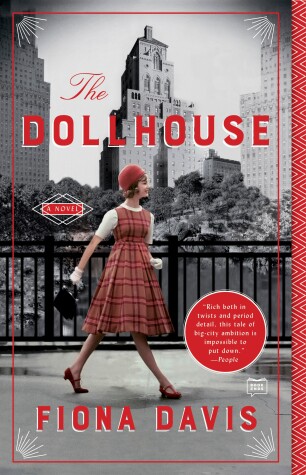Reviewed by Amber (The Literary Phoenix) on
*deep breath*
Okay. So, The Dollhouse is supposed to be this dual-timeline historical fiction novel drawing parallels between Rose and Darby, two patrons of the Barbizon Hotel in NYC, half a century apart. Intrigued by the history of beautiful architecture (my secret weakness – you should see me on vacation) I pushed past all the red flags about this book and was determined to learn its secrets. I approach history-about-buildings with the same distant, awed reverence as I do the Overlook Hotel or Haunted Mansion.
There are no ghosts in The Dollhouse, though. Not that any were promised – they weren’t. I just expected something more substantial and convincing. The plot grew stale in the early chapters, particularly Rose’s timeline. This is very much not a book for me in the sense that the modern timeline was riddled with instalove and a “self-made woman” who gave up everything in a blink for a man. A horrible one at that. And, believe me, I know there is a market for that kind of story and I really can’t blame Fiona Davis for catering to it… but it’s a genre I actively avoid because I can’t take it seriously and it’s just unenjoyable for me. So there goes Rose’s whole storyline.
I hung on for Darby, at least at first. This could have been an interesting historical fiction, despite its tendency to play in stereotypes of the era. I believe in Darby’s character, Fiona Davis was trying to show Darby as a progressive young woman who may not be a powerful character, but she was nevertheless resolute. The deeper into the story I read, the more even this thread frayed until there were no true consequences and every act was just played off, a means to an end. It ceased to be entertaining and became exhausting. Even though the marathon began for me before the 40% mark, I was completely done and ready to DNF at 81%. But, once you get that far, you may as well just finish it. In the case of The Dollhouse, the ending simply provided more incredible coincidences and tied the whole thing together with a happy yellow satin bow.
Blech.
Implausible storyline and excessive, illogical romance aside, I had problems with this. It’s not even the characters – I think Darby and Rose were well written enough and both could be relatable to the right type of reader (not me). The transitions were cheesy, the setting peppered in like facts Fiona Davis could have gleaned from a 1950s travel pamphlet. I expected a popular historical fiction writer to have intricate, well-researched descriptions… but honestly the Barbizon pops off the page with all the grace and splendor of a Wikipedia article (read: barely at all). Because I don’t have a hardcopy of this, I didn’t see any sort of source list, but honestly… maybe there wasn’t one. This didn’t have the feel of a deeply researched, compelling novel. It was sensationalist, at the best. The Barbizon is a setting, and not an entity in itself like the title and Darby suggest.
Other things that really bothered me:
- The treatment of mental health in this book was … not good. And I can’t find a single review that mentions it, but Griff’s daughter (Miranda) is diagnosed with bipolar disorder and the conversations we hear treat it like a terminal disease and they look into a “safe house” for Miranda “to get her the help she needs”. Poor girl may need a therapist, but looking to lock her up? This made me mad from the first pages. What terrible rep.
- For a book about strong women, particularly when one of those went to special lengths to talk about how she didn’t want to get married, the protagonists wasted no time prostrating themselves in front of pretty boys.
- Although the book never uses the word “gay” or “homosexual”, it referred to a male LGBTQ+ character as “a degenerate”. The whole scene is plastered with feelings of shame, which continued to rise up in a damaging and non-productive way in each of the handful of times same-sex attraction was mentioned.
- The one diverse character in the book is described as “manic” and made out to be the villain. There were many other ways for the story to go to lead to the same ending without making that choice. Other racist moments as well that aren’t really addressed. Just like “it’s fine, it’s set in the 50s!”. It’s not fine.
Just generally some really problematic undertones here that made me uncomfortable. And it kinda drives me crazy because I started combing reviews looking for anyone else discussing this stuff and I found nothing. Other reviewers agree that the story is a bit drastic and the characters dull, but I couldn’t find anyone else concerned with the mental health, diversity, and LGBTQ+ rep and honestly? I’m a bit concerned. It’s not good.
So overall, you can pass by this one. It’s not a remarkable book. And, even though it would probably wave the “but it’s historical fiction and I’m trying to be realistic!” flag, the rep is nevertheless problematic and this just isn’t worth you time, if you ask me.
But hey maybe you know someone who really enjoys romances pretending to be historical fiction and who don’t care much about character development and are in it for scandal and chaos and dramatic turns you saw coming from a mile away and maybe that person will like it.
Ugh, sorry guys. I’m salty. The mental health rep really bothered me and the other bits were icing and… that negative view stuck with me the rest of the book.
Reading updates
- Started reading
- 12 June, 2020: Finished reading
- 12 June, 2020: Reviewed
